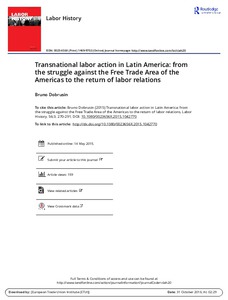Transnational labor action in Latin America: from the struggle against the Free Trade Area of the Americas to the return of labor relations

2015
56
3
July
270-291
free trade area ; social movement ; trade union solidarity ; trade union
Trade unionism
http://dx.doi.org/10.1080/0023656X.2015.1042770
English
Bibliogr.
"Neoliberalism was the hegemonic political and economic model in Latin America during the 1990s. The promotion of a Free Trade Area of the Americas (FTAA) was a fundamental policy to extend neoliberal policies and foreign influence throughout the region. In a momentum built throughout that decade and into the 2000s, the trade union movement joined forces with social movements to create a counterhegemonic force using traditional and novel power resources. This alliance managed to defeat the FTAA and was a central force in supporting new center-left administrations throughout the region. The developments since that historic event have shown the relevance of political contexts and strategic outlooks for the long-term success in maintaining, or failing to maintain, such kinds of alliances."
Digital
The ETUI is co-funded by the European Union. Views and opinions expressed are however those of the author(s) only and do not necessarily reflect those of the European Union or the ETUI.